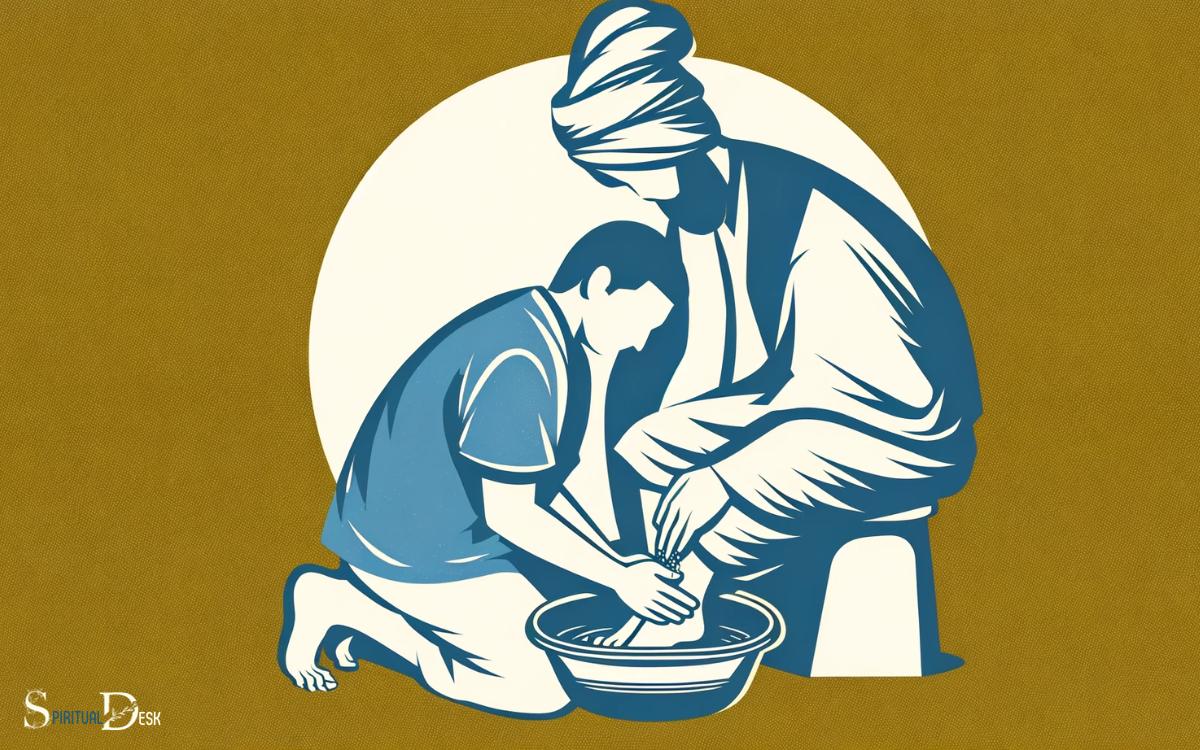What Is The Spiritual Meaning Of Washing Feet? Humility!
The spiritual meaning of washing feet, typically associated with Christianity and the Bible, is a symbol of humility, service, cleansing, and love. It represents the act of serving others and purifying oneself from sin.
The ritual of washing feet has its origins in the Christian faith, where Jesus washed the feet of his disciples. This was not just an act of physical cleanliness but a deeper spiritual message.
Jesus demonstrated humility and service, teaching his followers that no one is too important to serve others.
Simultaneously, washing feet is seen as a spiritual cleansing, washing away sin and symbolizing a new start.
The spiritual meaning of washing feet goes beyond a simple physical act. This ritual serves as a powerful reminder of the virtues of humility, service, cleansing, and love that are essential for a fulfilled spiritual life.

Key Takeaway
8 Aspects of Spiritual Meaning of Washing Feet
| Spiritual Aspect | Meaning of Washing Feet |
|---|---|
| Humility | Washing feet symbolizes humility and willingness to serve others, as it was a task typically done by servants. |
| Cleansing | The act of washing feet can also represent the cleansing of one’s soul, as well as the forgiveness and renewal of a person’s spirit. |
| Love and Compassion | Washing someone’s feet is an act of love and compassion, as it shows care and concern for the well-being of others. |
| Submission | By allowing someone to wash your feet, you are showing submission and trust in that person’s authority or guidance. |
| Unity | Washing each other’s feet can symbolize unity and togetherness, as it is an act of mutual support and understanding. |
| Service | Washing feet is a way to demonstrate a commitment to serve others, often in a spiritual context or as part of a religious ritual. |
| Forgiveness | In some spiritual traditions, washing feet is believed to symbolize the offering of forgiveness, both to oneself and to others. |
| Spiritual Growth | The act of washing feet can signify spiritual growth and development, as it is often associated with the practice of self-reflection and inner growth. |
Historical and Cultural Significance
The historical and cultural significance of washing feet can be traced back to various ancient civilizations and religious traditions.

- In many ancient societies, foot washing was a sign of hospitality and respect.
- For example, in ancient India, offering water to wash the feet of a guest was a common practice.
- In ancient Rome, slaves would wash the feet of guests as they arrived at a household.
- In religious traditions, foot washing symbolizes humility, service, and purification.
- In Christianity, it is a symbolic act of humility and service, with Jesus washing the feet of his disciples as an act of love and humility.
- Similarly, in Hinduism, washing the feet of a guru or a respected elder is a sign of reverence and surrender.
Across cultures and religions, the act of washing feet holds deep historical and cultural significance.
Symbolism in Christianity

The act of washing feet holds deep symbolic significance in Christianity, representing humility and servanthood.
The act of washing feet is a powerful demonstration of humbleness, as it signifies putting others� needs before one�s own.
In Christianity, it serves as a reminder of Jesus� teachings on serving others and the importance of humility in one�s actions.
Feet as Humbleness Symbol
Exploring the symbolism of feet in Christianity reveals the profound significance of humbleness within the act of washing feet.
In Christian tradition, feet are often seen as a symbol of humbleness and service, and this symbolism is deeply rooted in the act of Jesus washing the feet of his disciples.
This act exemplifies the humility and servitude that Christians are called to embody in their own lives.
The significance of feet as a humbleness symbol is further emphasized by the biblical verses that encourage believers to serve one another and to consider others as more important than themselves.
The act of washing feet, therefore, serves as a powerful reminder of the importance of humility and selfless service in the Christian faith.
Act of Servanthood
Feet symbolize servanthood and humility in Christian tradition. They exemplify the call for believers to embody selfless service and humility in their lives.
The act of washing feet, as demonstrated by Jesus in the Bible, signifies the ultimate act of servanthood. It is a powerful symbol of love, compassion, and the willingness to serve others.
By washing the feet of his disciples, Jesus set an example of humility and love. He emphasized the importance of serving others with a selfless attitude.
This act challenges individuals to set aside their pride and ego, and instead, to embrace a mindset of humility and servanthood.
In Christianity, the act of washing feet serves as a reminder of the importance of serving others with love and humility. It reflects the teachings and actions of Jesus.
Rituals in Hinduism and Buddhism

In Hinduism and Buddhism, rituals play a significant role in spiritual practice. The act of washing feet holds symbolic and ritualistic importance in both faiths.
This practice is often associated with purification and is performed as a sign of respect and humility.
Feet Washing Symbolism
Rituals of foot washing hold spiritual significance in Hinduism and Buddhism, symbolizing purification and humility through the act of cleansing the feet of revered individuals.
- Hinduism: In Hinduism, the ritual of washing the feet of esteemed guests or deities is known as �Charanamrita.� It is a gesture of respect and devotion, symbolizing the cleansing of impurities and the welcoming of positive energy.
- Buddhism: In Buddhism, the act of washing the feet of a Buddha statue or a revered monk is a form of veneration and an expression of humility. It represents the willingness to serve and show reverence to the enlightened ones.
- Symbolism: Both in Hinduism and Buddhism, the act of washing feet symbolizes the removal of negativity and impurities, while also signifying the importance of humility and service towards others.
This symbolism reflects the deep spiritual significance attributed to the act of feet washing in these traditions, emphasizing the values of purity and reverence. These themes are further explored in the subsequent section about �purification in rituals�.
Purification in Rituals
Purification rituals in Hinduism and Buddhism hold significant spiritual importance, embodying the reverence for purity and the expression of humility through cleansing practices.
In Hinduism, the ritual of �puja� involves the purification of the body, mind, and spirit through the symbolic washing of hands and feet before entering a sacred space.
This act symbolizes the removal of impurities and the readiness to engage in worship with a pure heart and mind.
Similarly, in Buddhism, the act of �ablution� or �uddesika� involves the cleansing of the body and mind to prepare for meditation and spiritual practice.
These rituals emphasize the significance of inner purity and the humility of acknowledging one�s imperfections before engaging in spiritual activities.
The act of washing feet in these traditions serves as a powerful symbol of spiritual cleansing and preparation for sacred engagements, reflecting the reverence for purity and humility.
This emphasis on purity and humility sets the stage for the subsequent section about �the act of service and humility�.
The Act of Service and Humility

The act of washing feet symbolizes a profound demonstration of service and humility in many spiritual traditions. This act conveys deep spiritual significance, emphasizing the values of selflessness and humility.
Here are three key aspects that highlight the spiritual meaning of washing feet:
- Symbol of Service: Washing someone�s feet is a symbolic gesture of serving others with love and compassion.
- Expression of Humility: By humbly bowing down and washing another person�s feet, individuals express their willingness to serve and honor others before themselves.
- Equality and Respect: Washing feet signifies the recognition of the inherent worth and dignity of every individual, regardless of their social status or background.
This act of service and humility serves as a powerful reminder of the importance of compassion and selflessness in spiritual practice.
Transitioning into the subsequent section about healing and purification traditions, the act of washing feet also holds significance in these practices.
Healing and Purification Traditions
Incorporating the act of washing feet into healing and purification traditions symbolizes a holistic approach to spiritual and physical well-being.
Across various cultures and religious practices, washing feet is recognized as a powerful symbol of cleansing, renewal, and healing.
The act of washing feet is deeply rooted in the belief that it not only purifies the body but also cleanses the spirit, promoting a sense of inner peace and emotional balance.

In healing traditions, such as traditional Chinese medicine and Ayurveda, the feet are considered a reflection of the entire body, and by cleansing them, one can promote overall wellness.
Moreover, in many spiritual traditions, washing feet is seen as a way to release negative energy and promote spiritual healing, fostering a sense of connection and harmony with oneself and others.
Modern Interpretations and Practices
In contemporary spiritual practices, the act of washing feet continues to hold significance, reflecting a renewed emphasis on holistic well-being and spiritual connection.

This ancient ritual has evolved to encompass modern interpretations and practices, including:
- Symbolic Gesture: Many spiritual traditions view foot washing as a symbolic act of humility, service, and reverence for others, emphasizing the importance of compassion and selflessness in today�s world.
- Therapeutic Benefits: Some modern practitioners incorporate foot washing into wellness rituals, recognizing its therapeutic benefits for relaxation, stress relief, and promoting overall well-being.
- Interfaith Dialogue: The practice of foot washing has also become a symbol of interfaith dialogue and understanding, fostering unity and respect among diverse spiritual communities.
These contemporary interpretations and practices highlight the enduring relevance of foot washing in nurturing spiritual values and fostering connections in the modern era.
Conclusion
The act of washing feet holds deep spiritual significance across various cultures and religions. It symbolizes humility, service, and purification, and is a powerful gesture of care and respect.
Whether in Christianity, Hinduism, Buddhism, or other traditions, the act of washing feet is a visual representation of the values of compassion, kindness, and spiritual cleansing.
This ancient practice continues to hold meaning and importance in modern times, reminding us of the power of selfless service and humility.






